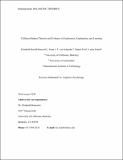Children balance theories and evidence in exploration, explanation, and learning
Author(s)
Bonawitz, Elizabeth Baraff; van Schijndel, Tessa J.P.; Friel, Daniel; Schulz, Laura E.
DownloadBonawitzVanschijndelFrielSchulz2011.pdf (279.6Kb)
PUBLISHER_CC
Publisher with Creative Commons License
Creative Commons Attribution
Terms of use
Metadata
Show full item recordAbstract
We look at the effect of evidence and prior beliefs on exploration, explanation and learning. In Experiment 1, we tested children both with and without differential prior beliefs about balance relationships (Center Theorists, mean: 82 months; Mass Theorists, mean: 89 months; No Theory children, mean: 62 months). Center and Mass Theory children who observed identical evidence explored the block differently depending on their beliefs. When the block was balanced at its geometric center (belief-violating to a Mass Theorist, but belief-consistent to a Center Theorist), Mass Theory children explored the block more, and Center Theory children showed the standard novelty preference; when the block was balanced at the center of mass, the pattern of results reversed. The No Theory children showed a novelty preference regardless of evidence. In Experiments 2 and 3, we follow-up on these findings, showing that both Mass and Center Theorists selectively and differentially appeal to auxiliary variables (e.g., a magnet) to explain evidence only when their beliefs are violated. We also show that children use the data to revise their predictions in the absence of the explanatory auxiliary variable but not in its presence. Taken together, these results suggest that children’s learning is at once conservative and flexible; children integrate evidence, prior beliefs, and competing causal hypotheses in their exploration, explanation, and learning.
Date issued
2012-01Department
Massachusetts Institute of Technology. Department of Brain and Cognitive SciencesJournal
Cognitive Psychology
Publisher
Elsevier
Citation
Bonawitz, Elizabeth Baraff, Tessa J.P. van Schijndel, Daniel Friel, and Laura Schulz. "Children balance theories and evidence in exploration, explanation, and learning." Cognitive Psychology 64 (2012) pp.215–234.
Version: Author's final manuscript
ISSN
00100285
1095-5623